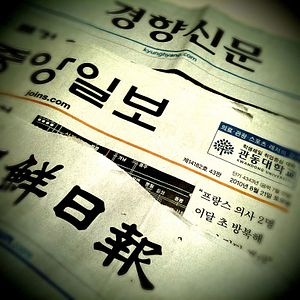Reporters Without Borders, or Reporters Sans Frontières (RSF), which publishes the ranking annually, gave most of the credit for the country’s advancement to the current Moon Jae-in administration.
“The election of Moon Jae-in, a human rights activist and former political prisoner, as president has been a breath of fresh air after a bad decade in which South Korea fell more than 30 places on RSF’s World Press Freedom Index,” the organization noted.
But that “fresh air” appears to be fading away already, given several recent ominous moves taken by the government.
First, the Unification Ministry decided to exclude a North Korean defector-turned-journalist from covering the latest inter-Korean high-level talks.
Citing safety concerns and other “special” circumstances, the ministry earlier decided to exclude Kim Myeong-sung of a local daily newspaper, Chosun Ilbo, from the group of journalists sent to cover the high-level talks with North Korea. Chosun Ilbo is one of the largest and most influential newspapers in the country and Kim has worked for the news company for years, specializing in covering North Korea and inter-Korean affairs.
The press corps of the Unification Ministry chooses a pool of reporters for inter-Korean events based on a predetermined order. According to a statement from the press corps, no ministry had ever intervened in the pool membership before.
The ministry’s decision sparked major controversy due to the possible violation of freedom of speech.
The press corps of the Unification Ministry issued a statement, arguing that Kim’s exclusion is “inappropriate” and represents a “serious violation” of the freedom of the press. They also demanded an apology from the ministry and asked for efforts to be made to prevent a similar incident happening again.
The ministry later told reporters that its move had nothing to do with restricting the press but officials did not make any promises about preventing a repeat occurrence.
The Unification Ministry is not alone. South Korea’s Ministry of Justice also sparked concern on October 16, when it announced a series of measures to crack down the circulation of false and fabricated information.
In particular, Minister of Justice Park Sang-gi pointed out the necessity of cracking down on fake news in the country as soon as possible, ordering a close and strict investigation of persons who are believed to be spreading false or fabricated information.
Park’s remarks came after the National Police Agency’s crackdown on fake news. The agency has been actively monitoring and stopping the circulation of fake news since September.
“The issue [of fake news] has become more high profile recently with the increasing number of social media networking services, blogs, and online news outlets,” said Min Gab-lyong, head of the agency, who vowed to eradicate this issue through strict investigations.
Like many around the world, the South Korean government is eager to crack down on the circulation of false information and fake news. The issue is that it has not been able to set up a concrete definition of what constitutes false, fabricated, and fake information or news.
In the latest parliamentary questions, a Seoul-based lawmaker, Choo Hye-sun, pointed out the risk of the government arbitrarily defining what is fake or not, raising concerns over the potential violation of speech and press freedoms.
A civic group, Citizens’ Coalition for Economic Justice, also released a statement criticizing the government’s moves. “Beyond the purpose of preventing fake news, it is likely to violate freedom of speech and excessively restrict freedom of expression,” the group said in the statement.
“With various institutional measures already in place to punish fake news, the Ministry of Justice’s measures that are likely to violate freedom of expression without social consensus should be withdrawn,” it added.
Moon Jae-in said on October 24 that he will try his best to make moves to protect media freedom, keeping it as a source of pride for citizens of the country.
His remarks were made while celebrating a plan to establish a monument symbolizing media freedom.
The monument, which is expected to be set up in central Seoul in March 2019, will be designed and established by a group of journalists of Dong-A Ilbo, a Seoul-based daily newspaper. Reporters from the paper famously fought against the dictatorship of the 1970s in an effort to protect freedom of speech and the media.
Moon said that he believed what Dong-A Ilbo journalists did was a brave move that ignited the hope of freedom in South Korean people’s heart, adding that he would like to send out grateful messages to all journalists who fought for media freedom.
While his remarks appeared to be well-intentioned and spoken with sensitivity, but all these statements were made in the past tense. It is certain that Moon did not intend to relegate the issue of media freedom to the past, but it was a good reminder of the continuing struggle South Korea faces with its media freedoms.
































